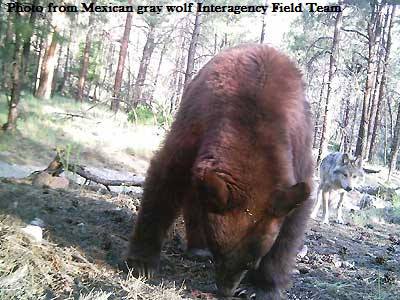12
Aug
Wolves in Yellowstone Help Grizzly Bears Fatten Up

The reintroduction of wolves into Yellowstone National Park has an unexpected upside: It’s helping to fatten up the bears, new research suggests.
The wolves have kept the park’s population of elks (prey for wolves) in check, which in turn limits how many berry-producing shrubs the elks consume. As a result, the bears have more tasty berries to eat, finds a study published today (July 29) in the Journal of Animal Ecology.
The study points “to the need for an ecologically effective number of wolves,” said co-author Robert Beschta, a researcher at Oregon State University, in a statement. “As we learn more about the cascading effects they have on ecosystems, the issue may be more than having just enough individual wolves so they can survive as a species. In some situations, we may wish to consider the numbers necessary to help control over browsing, allow tree and shrub recovery, and restore ecosystem health.”
Wolves were first removed from Yellowstone National Park in the 1920s, after which the elk population soared. The huge herds of elk heavily browsed aspen and willow in the park and reduced the berry-producing shrubs. Past studies showed the reintroduction of wolves in 1995 has led to willow and aspen populations rebounding. “¦
The reintroduction seemed to have a beneficial effect on bears.
Now, Beschta and colleagues have found the amount of fruit in grizzly bear scat doubled in August in recent years, which means the bears were eating more of it. The grizzlies love to graze on the park’s many wild berry species, such as serviceberry, chokecherry, buffaloberry, twinberry and huckleberry.
“Wild fruit is typically an important part of grizzly bear diet, especially in late summer when they are trying to gain weight as rapidly as possible before winter hibernation,” said study co-author William Ripple, a forest ecosystems researcher at Oregon State University, in a statement. “Berries are one part of a diverse food source that aids bear survival and reproduction, and at certain times of the year can be more than half their diet in many places in North America.”
Because bears have made up for the decline in berries by eating more elk in the last 50 years, the berry bounty may also help offset the decline in elk.
*****
This article was published on Live Science on July 29, 2013.
___________________________________________________________________________________________
Click here to join our email list for Mexican gray wolf updates and action alerts.
Visit us on Facebook here.
Click here to join our email list for Mexican gray wolf updates and action alerts.
Visit us on Facebook here.



